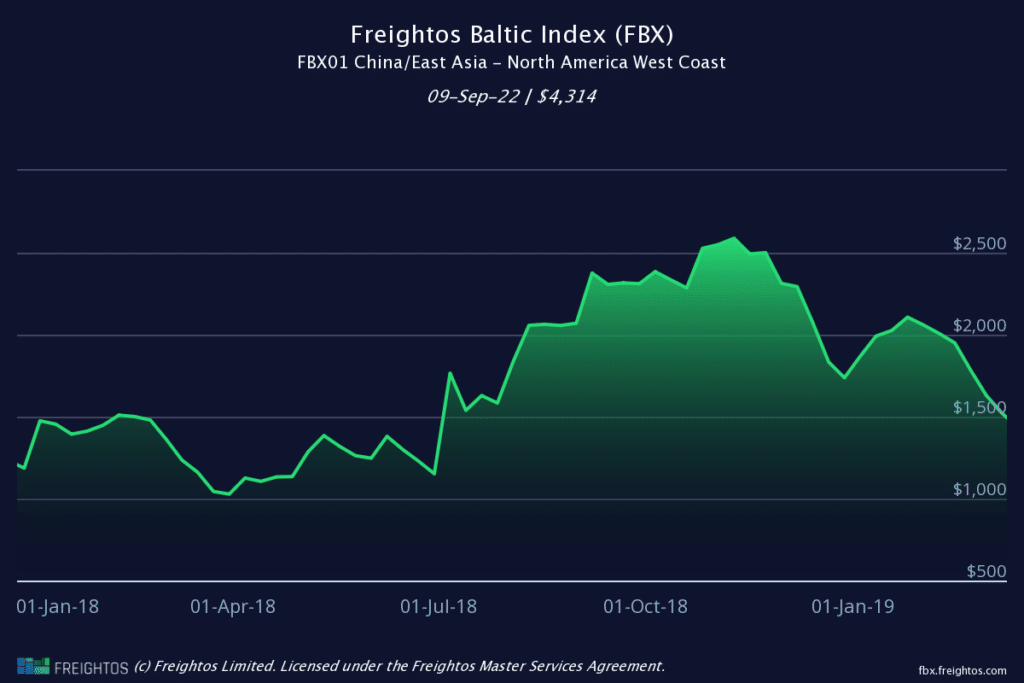Shipping delays are always frustrating. They can throw off your supply chain and result in high operational costs, penalties, and, worst of all, unhappy customers.
Very often, delayed freight deliveries are out of your hands.
But, you can control some variables to give your shipment the best chance of being delivered on time.
Read on to understand the top reasons for shipment delays and how to avoid them whenever possible.
Top Reasons & Causes of Shipping Delays
Here are the main reasons why your shipment may be delayed:
- Incorrect documentation
- Peak season
- Not planning for extra equipment
- Global events
- Sudden changes in consumer habits
- Port congestion and traffic
- Trucking issues
- Weather conditions
Let’s explore each in detail (and how you can make them right!)
Reason #1: Incorrect documentation
Not having proper documents and paperwork can lead to delays throughout the shipping process, from leaving the port of origin, to clearing customs, to arriving at the shipping destination.
Here are some common errors to avoid:

Missing paperwork
Freight shipping requires essential paperwork including a bill of lading, commercial invoice, origin certificate, and any relevant special certificates (if any). Missing documents mean an extended customs inspection, which delays delivery.
Inaccurate content description
Errors in details such as HS code, country of origin, and product specifications slow down the clearance process and can even lead to a shipment being denied entry.
Blurry writing
Your documents get checked at every point, from the port of origin to loading, unloading, transfers, and customs. Legible handwriting keeps your goods moving faster. Particularly when it comes to customs clearance, unclear or blurry print will not be given the benefit of the doubt and will likely cause delays.
Keep your papers safe from rain or moisture to avoid ink smudging.
Improper labels
Shipping labels contain vital information about your cargo. Improper labeling can result in delayed customs clearance or misplaced cargo in some cases. If you’re an FBA shipper, make sure your labels comply with Amazon requirements.
Missing export license
Commercial shipments require an export license for overseas transportation. If your export license is missing or expired, the shipment may be denied exit from the country of origin, slowing down your entire supply chain.
Documentation is a hassle, but it’s one area where attention to detail upfront can prevent delays. So, make sure to:
- Check that all your paperwork is in order, updated, and legible
- Create (and follow!) a checklist before shipping your goods of all the required documents
- Work with trusted partners to avoid errors
Reason #2: Peak season
Peak seasons are times during the year when higher-than-usual volumes of freight are shipped.
When is Peak Shipping Season?
Peak season for ocean freight typically begins in August with back-to-school shopping and continues until November as businesses prepare for the US holiday season. After a lull in December-early January, Lunar New Year in late January-early February pauses production and exports in some East Asian countries.
Here’s a chart of a typical peak season for FCL shipments from China to the West Coast.

Want to see more charts like this? Head to Freightos FBX.
Peak Season Means High Demand and Low Supply
During peak season, your freight may be delayed due to high shipment volumes.
It is a classic example of high demand and low supply, which puts pressure on the supply chain and logistics network.
Peak season is one of the top reasons for delays. It can also lead to higher freight costs or a peak season surcharge.
To help avoid peak season delays, many importers and exporters break their goods into smaller shipments and ship in advance.
Reason #3: Not Planning for Extra Equipment and Service
According to the Wall Street Journal, it takes 3000 people working tirelessly with equipment for 3 days to unload a vessel with 20,000 containers. This resource-intensive process is one of the primary causes of shipping delays and high operational costs.
To avoid unexpected delays, work with your freight forwarder and plan ahead for any extra equipment required to handle your cargo. Opt for trusted trucking services and get all permits cleared in advance so your cargo can get moving right after unloading.

Unavoidable Causes of Shipping Delays
So far, we have discussed shipping delays somewhere within your control.
Other delays are not preventable. Here are some of the things that can (but usually don’t) go wrong in shipping. While you can’t prevent them, you can build in extra planning time wherever possible to minimize impact.
Reason #4: Global Events
Sometimes things just happen. And when they do, they affect international shipping. Some recent examples include:
COVID-19
Manpower and equipment became scarce in many countries due to COVID. As the industry is still recovering from the pandemic aftermath, a sudden spike in demand has led to congestion in ports and vessel delays.
Factory-to-door delivery times nearly doubled on major Asian to US lanes as COVID-19 restrictions eased up in 2021. Now, the average transit times from China-US have steadily fallen since the start of 2022. But, backlog and congestion are still one of the major reasons causing shipment delays.

Suez Canal Blockade
In March 2021, the Ever Given, a massive container ship, blocked the Suez Canal for six days. 369 other vessels queued up to pass the canal on both sides, causing major shipment delays and congestion on the Asia-Europe lane. The entire fiasco resulted in a loss of $9.6 billion worth of goods per day.
Russia-Ukraine War
The war in Ukraine led to the closing of important ports in Russia and halting of operations in the Black Sea. Import and export of major commodities were affected severely.
These unexpected events had catastrophic effects on the supply chain network and the shipping industry as a whole.
Check out our shipping delays update page to find out more.
Reason #5: Sudden Changes in Consumer Habits
Any changes in global consumer habits immediately ripple through the shipping industry.
For example, over the past two years, consumer preferences around the world tilted toward online shopping and eCommerce. This led to higher than ever cross-border demand for products. The production of vessels and development of infrastructure, however, couldn’t keep up with the sudden increase.
This was a major reason for the delay in delivery of goods and vessel delays across the supply chain globally. In fact, according to reports, 42% of online shoppers abandoned their carts due to long delivery times.
Reason #6: Port Congestion & Traffic
Due to a shortage of manpower, storage, and handling equipment, ports in the US have faced severe congestion.
- In Q1 2022, the Oakland port had an average dwell time of 7 days, making it one of the world’s worst ports for congestion
- Other major ports like Long Beach, Charleston, and LA follow closely behind in terms of congestion traffic and vessel delays.
- Even when shipments arrive on time, vessels have a longer than usual waiting time before finally unloading the cargo.
The best way to work around this uncertainty is to include buffer time in your shipment plan and send your shipment to less-clogged ports.

Reason #7: Trucking Issues
Delays in truck loading or capacity are a major headache for shippers and forwarders. The low supply of chassis (load-bearing equipment used by trucks) further aggravates the trucking delays.
Reason #8: Weather Conditions
Bad weather hinders the movement of freight across all modes of transport. Ships and airlines often face scheduling difficulties due to decreased visibility on coasts and airports. Nearly 23% of all delays in road transportation are caused by unpredictable weather conditions.
How to Prevent Shipping Delays: A Checklist
It’s not all bad news. Here’s what you CAN do to prevent and manage shipping delays:
Choose reliable providers
- Work with vetted providers you can trust
- Pay close attention to your providers’ experience and performance reviews
- Plan any extra services you need for delivery of your goods to avoid surprises down the line
Ensure alignment between your providers
- Give your supplier accurate contact information for your freight forwarder – and vice versa – to ensure smooth communication
- Make sure all your providers have the correct reference number for your goods
- Clearly differentiate shipments from the same supplier to ensure timely delivery of each shipment
Make sure all paperwork is in order
- Spend extra time reviewing all the documents related to your shipment
- Make sure your goods are classified with the correct HS code
- Work with your providers to file paperwork on time
Work with your forwarder to arrange a smooth warehouse drop off
- Get the estimated time of arrival at the port from your freight forwarder
- Ensure in advance that any special equipment required for handling is available
- Arrange for quick freight pickup right after unloading
- Book warehouse space ahead of time
Plan ahead for peak season
- Avoid shipping goods during peak season as much as possible
- Keep in mind any promotional campaigns or expected spikes in demand
- Prioritize shipments of fast-selling goods
Plan ahead so you’re not caught short on inventory
- Keep buffer inventory for markets likely to be impacted by delays
- Store inventory across several warehouses to optimize transit time and costs
- Account for avoidable causes of shipping delays – but remember that some delays are not avoidable
Remember – delays happen! Plan ahead and build in buffer time.
Shipping delays may not be entirely avoidable, but you can mitigate their impact on your business. As you work to manage possible delays, remember to keep your customers updated about the status of their goods. This will minimize the chances of soured relationships and complaints.



